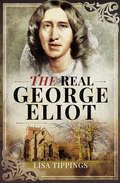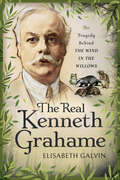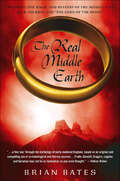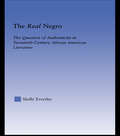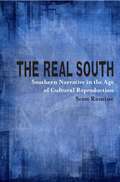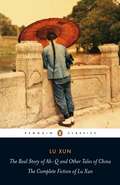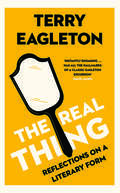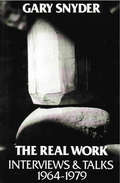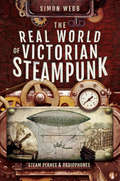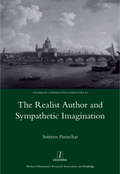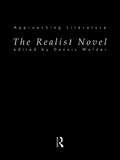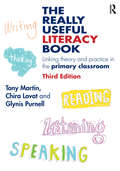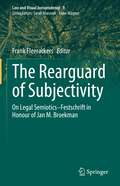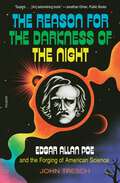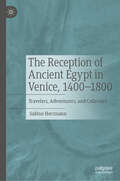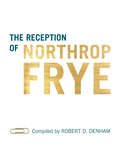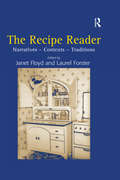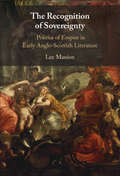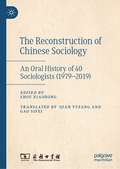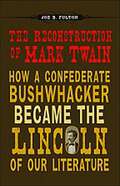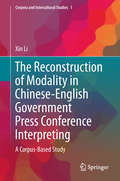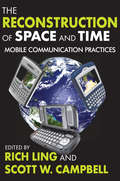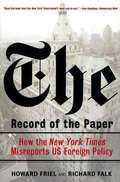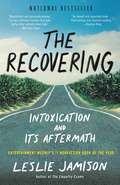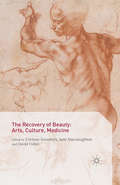- Table View
- List View
The Real George Eliott
by Lisa TippingsThe Real George Eliot revisits the life of the groundbreaking nineteenth century novelist. Eliot was a writer who explored such important questions as the role of women in society and the education they were allowed to access, religion and the restrictions it could sometimes place on individuals, and the struggle between a person’s public and private persona. Her own private life was the cause of much speculation and notoriety. Eliot chose to ignore most of the conventions of Victorian society in order to pursue her own happiness, and her relationship with George Henry Lewes scandalized many members of ‘polite’ society. Regardless of this, however, she overcame such prejudice and in later life enjoyed the company of some of the greatest thinkers and academics of the time, and this is a testament to her formidable intelligence. The fact that she is still so widely read today, is a sign of the longevity of her skills as a writer.
The Real Kenneth Grahame: The Tragedy Behind The Wind in the Willows
by Elisabeth GalvinHe wrote one of the most quintessentially English books, yet Kenneth Grahame (1859 – 1932) was a Scot. He was four years old when his mother died and his father became an alcoholic, so Kenneth grew up with his grandmother who lived on the banks of the beloved River Thames. Forced to abandon his dreams of studying at Oxford, he was accepted as a clerk at the Bank of England where he became one of the youngest men to be made company secretary. He narrowly escaped death in 1903 when he was mistaken for the Bank’s governor and shot at several times. He wrote secretly in his spare time for magazines and became a contemporary of contributors including Rudyard Kipling, George Bernard Shaw and WB Yeats. Kenneth’s first book, Pagan Papers (1893) initiated his success, followed by The Golden Age (1895) and Dream Days (1898), which turned him into a celebrated author. Ironically, his most famous novel today was the least successful during his lifetime: The Wind in the Willows (1908) originated as letters to his disabled son, who was later found dead on a train line after a suspected suicide. Kenneth never recovered from the tragedy and died with a broken heart in earshot of the River Thames. His widow, Elspeth, dedicated the rest of her life to preserving her husband’s name and promoting his work.
The Real Middle Earth: Exploring the Magic and Mystery of the Middle Ages, J.R.R. Tolkien, and "The Lord of the Rings"
by Brian BatesJ.R.R. Tolkien claimed that he based the land of Middle Earth on a real place. The Real Middle Earth brings alive, for the first time, the very real civilization in which those who lived had a vision of life animated by beings beyond the material world. Magic was real to these people and they believed their universe was held together by an interlaced web of golden threads visible only to wizards. At its center was Middle Earth, a place peopled by humans, but imbued with spiritual power. It was a real realm that stretched from Old England to Scandinavia and across to western Europe, encompassing Celts, Anglo Saxons and Vikings. Looking first at the rich and varied tribes who made up the populace of this mystical land, Bates looks at how the people lived their daily lives in a world of magic and mystery. Using archaeological, historical, and psychological research, Brian Bates breathes life into this civilization of two thousand years ago in a book that every Tolkien fan will want.
The Real Negro: The Question of Authenticity in Twentieth-Century African American Literature (Literary Criticism And Cultural Theory Ser.)
by Shelly EversleyIn this book, Shelly Eversley historicizes the demand for racial authenticity - what Zora Neale Hurston called 'the real Negro' - in twentieth-century American literature. Eversley argues that the modern emergence of the interest in 'the real Negro' transforms the question of what race an author belongs into a question of what it takes to belong to
The Real South: Southern Narrative in the Age of Cultural Reproduction (Southern Literary Studies)
by Scott RomineIn this stimulating study, Scott Romine explores the impact of globalization on contemporary southern culture and the South's persistence in an age of media and what he terms "cultural reproduction." Rather than being compromised, Romine asserts, southern cultures are both complicated and reconfigured as they increasingly detach from tradition in its conventional sense. In considering Souths that might appear fake -- the Souths of the theme restaurant, commercial television, and popular regional magazines, for example -- Romine contends that authenticity and reality emerge as central concepts that allow groups and individuals to imagine and navigate social worlds.Romine addresses a major critical problem -- "authenticity" -- in a fundamentally new manner. Less concerned with what actually constitutes an "authentic" or "real" South than in how these concepts are used today, The Real South explores a wide range of southern narratives that describe and travel through virtual, simulated, and commodified Souths. Where earlier critics have tended to assume a real or authentic South, Romine questions such assumptions and whether the "authentic South" ever truly existed.From Gone with the Wind, Civil War reenactments, and a tennis community outside Atlanta called Tara, to the work of Josephine Humphreys, the travel narrative of V. S. Naipaul, and the historical fiction of Lewis Nordan, Romine examines how narratives (and spaces) are used to fashion social solidarity and cultural continuity in a time of fragmentation and change. Far from deteriorating or disappearing in a global economy, Romine shows, the South continues to be reproduced and used by diverse groups engaged in diverse cultural projects.
The Real Story of Ah-Q and Other Tales of China: The Complete Fiction of Lu Xun
by Lu XunLu Xun (Lu Hsun) is arguably the greatest writer of modern China, and is considered by many to be the founder of modern Chinese literature. Lu Xun's stories both indict outdated Chinese traditions and embrace China's cultural richness and individuality. This volume presents brand-new translations by Julia Lovell of all of Lu Xun's stories, including 'The Real Story of Ah-Q', 'Diary of a Madman', 'A Comedy of Ducks', 'The Divorce' and 'A Public Example', among others. With an afterword by Yiyun Li.
The Real Thing: Reflections on a Literary Form
by Terry EagletonA clear-sighted and entertaining defence of literary realism, and an account of its key practitioners Realist fiction is one of the most enduring artforms history has ever witnessed. By describing the intricate inner life of its characters, or widening its focus to set their experience in context, it can evoke the reader&’s sympathies as few other forms can. Yet it is also by and large a product of the middle classes: boldly individualist and fascinated by money, property, marriage, and inheritance. Can such realism survive in the postmodern age? Acclaimed critic Terry Eagleton explores realism&’s complex history, practice, and politics. Spanning several centuries, and including writers such as George Eliot, D. H. Lawrence, and Iris Murdoch, Eagleton offers a witty, entertaining defence of a form which offers both panoramic scope and individual nuance in an increasingly fragmented world.
The Real Work: Interviews and Talks, 1964-79
by Gary Snyder William Scott McleanAmerican poet Gary Snyder on poetics, tribalism, ecology, Zen Buddhism, meditation, the writing process, and more. The Real Work is the second volume of Gary Snyder’s prose to be published by New Directions. Where his earlier Earth House Hold(1969) heralded the tribalism of the "coming revolution," the interviews in The Real Work focus on the living out of that process in a particular place and time––the Sierra Nevada foothills of Northern California in the 1970s. The talks and interviews collected here range over fifteen years (1964-79) and encompass styles as different as those of the Berkeley Barb and The New York Quarterly. A "poetics of process" characterizes these exchanges, but in the words of editor Mclean, their chief attraction is "good, plain talk with a man who has a lively and very subtle mind and a wide range of experience and knowledge."
The Real World of Victorian Steampunk: Steam Planes & Radiophones
by Simon WebbA look at the surprising nineteenth-century technology that inspires this literary and cultural movement: &“I was very impressed by this book.&” —SF Crowsnest In recent decades, steampunk has grown from a rather obscure subgenre of science fiction into a striking and distinctive style of fashion, art, design, and even music. It is in the written word, however, that steampunk has its roots—and in this book Simon Webb explores and examines the real inventions that underpin the fantasy. In doing so, he reveals a world unknown to most people today. Webb reveals the Victorian era as a surprising place: one of steam-powered airplanes, fax machines linking Moscow and St Petersburg, steam cars traveling at over 100 mph, electric taxis, and wireless telephones. It is, in short, the nineteenth century as you&’ve never before seen it—a steampunk extravaganza of anachronistic technology and unfamiliar gadgets. Imagine Europe spanned by a mechanical internet, a telecommunication system of clattering semaphore towers capable of transmitting information across the continent in a matter of minutes. Consider too, the fact that a steam plane the size of a modern airliner took off in England in 1894. Drawing entirely on contemporary sources, we see how little-known developments in technology have been used as the basis for so many steampunk narratives. From seminal novels such as The Difference Engine to the steampunk fantasy of Terry Pratchett&’s later works, this book shows that steampunk is at least as much solid fact as it is whimsical fiction.
The Realist Author and Sympathetic Imagination
by Sotirios Paraschas"The nineteenth century realist author was a contradictory figure. He was the focus of literary criticism, but obscured his creative role by insisting on presenting his works as 'copies' of reality. He was a celebrity who found himself subservient to publishers and the public, in a newly-industrialised literary marketplace. He was the owner of his work who was divested of his property by imperfect copyright laws, playwrights who adapted his novels for the stage, and sequel-writers. This combination of a conspicuous yet precarious status with a self-effacing attitude was expressed by an image of the author as a plural, Protean subject, possessing the faculty of sympathetic imagination - which the realists incorporated in their works in the form of a series of fictional characters who functioned as 'doubles' of the author. Paraschas focuses on two realists, Honorede Balzac and George Eliot, and traces this authorial scenario from its origins in the late eighteenth century to its demise in the early twentieth century, examining its presence in the works of E.T.A. Hoffmann, Friedrich Schlegel, Charles Baudelaire and Andre Gide."
The Realist Novel (Approaching Literature)
by Dennis WalderThis book guides the student through the fundamentals of this enduring literary form. By using carefully selected novels and discussing a wide range of authors including Emily Dickinson and John Kincaid, the authors provide a lively examination of the particular themes and modes of realist novels of the period. This is the only book currently available to provide such a wide range of primary and secondary material and is the prefect resource for a literature degree.
The Really Useful Literacy Book: Linking theory and practice in the primary classroom (The Really Useful)
by Tony Martin Chira Lovat Glynis PurnellNow in its third edition, The Really Useful Literacy Book is the definitive guide to the high quality teaching of literacy in your primary classroom. Written specifically for primary school teachers and student trainee teachers, this book offers inventive ideas for the classroom together with an accessible and informative summary of the theories that underpin them. It explores creative approaches to literacy teaching as well as offering a range of units on all areas – speaking, listening, reading and writing. While this book provides creative ideas that can be taken by teachers and developed for their own classrooms, it clearly explains the theoretical rationale for these ideas. It can also be used by school literacy leaders to develop whole school approaches and high quality teaching throughout the school. This accessible and engaging text will be an essential companion for all primary teachers, at any stage in their career, looking to motivate, engage and challenge their children in their literacy lessons.
The Rearguard of Subjectivity: On Legal Semiotics – Festschrift in Honour of Jan M. Broekman (Law and Visual Jurisprudence #9)
by Frank FleerackersEdmund Husserl’s ideas, informed by Kant’s Critiques, constituted a point of departure when rereading philosophical problems of subject and subjectivity. In his “Phänomenologie und Egologie” (1961/63), Jan Broekman revealed how Husserl analysed the “Split Ego” notion in Kant’s vision, which became fundamental for his phenomenology. The form and function of subjectivity were likewise positioned in psychiatry and literature, as well as in aesthetics, as Jan Broekman’s texts on ‘cubism’ demonstrated. Problems of ‘language’ unfolded in studies on topics ranging from the texts of Ezra Pound to the dialogic insights of Martin Buber, all of which were involved in the development of semiotics. Two themes accompanied these insights: the notion and later Parisian mainstream called structuralism, and the urgent need to arrive at deeper insights into the links between Marxism and phenomenology. Central language concepts also played a part: as early as 1986, Jan Broekman published on ‘semiology and medical discourse’, and in 1992 on ‘neurosemiotics’, before addressing the link between speech act and (legal as well as social) freedom in 1993. In all these works, the subject and the atmosphere of subjectivity were essential aspects. In addition to his writing, Jan Broekman gave courses on current philosophical issues, law and medicine until retiring in 1996, and in his “Intertwinements of Law and Medicine” revisited subjectivity aspects, while also offering a synthetic view.In this Festschrift in honour of Jan Broekman, the contributions address the analogue/digital dichotomy in semiotics, the multicultural self in language and semiotics, semiology and legal discourse, the legal subject and the atmosphere of subjectivity, intertwinements of law and medicine, the semiotics of law in legal education, signs in law and legal discourse, making meaning in law, and legal speech acts.
The Reason for the Darkness of the Night: Edgar Allan Poe and the Forging of American Science
by John TreschOne of The Christian Science Monitor's ten best books of JuneAn innovative biography of Edgar Allan Poe—highlighting his fascination and feuds with science.Decade after decade, Edgar Allan Poe remains one of the most popular American writers. He is beloved around the world for his pioneering detective fiction, tales of horror, and haunting, atmospheric verse. But what if there was another side to the man who wrote “The Raven” and “The Fall of the House of Usher”?In The Reason for the Darkness of the Night, John Tresch offers a bold new biography of a writer whose short, tortured life continues to fascinate. Shining a spotlight on an era when the lines separating entertainment, speculation, and scientific inquiry were blurred, Tresch reveals Poe’s obsession with science and lifelong ambition to advance and question human knowledge. Even as he composed dazzling works of fiction, he remained an avid and often combative commentator on new discoveries, publishing and hustling in literary scenes that also hosted the era’s most prominent scientists, semi-scientists, and pseudo-intellectual rogues. As one newspaper put it, “Mr. Poe is not merely a man of science—not merely a poet—not merely a man of letters. He is all combined; and perhaps he is something more.”Taking us through his early training in mathematics and engineering at West Point and the tumultuous years that followed, Tresch shows that Poe lived, thought, and suffered surrounded by science—and that many of his most renowned and imaginative works can best be understood in its company. He cast doubt on perceived certainties even as he hungered for knowledge, and at the end of his life delivered a mind-bending lecture on the origins of the universe that would win the admiration of twentieth-century physicists. Pursuing extraordinary conjectures and a unique aesthetic vision, he remained a figure of explosive contradiction: he gleefully exposed the hoaxes of the era’s scientific fraudsters even as he perpetrated hoaxes himself. Tracing Poe’s hard and brilliant journey, The Reason for the Darkness of the Night is an essential new portrait of a writer whose life is synonymous with mystery and imagination—and an entertaining, erudite tour of the world of American science just as it was beginning to come into its own.
The Reception of Ancient Egypt in Venice, 1400-1800: Travelers, Adventurers, and Collectors
by Sabine HerrmannThis book examines for the first time how ancient Egypt is reflected in early modern Venetian sources. As a center of the printing industry, Venice was an important hub for the accumulation and dissemination of direct information on the Near East and the Levant. Therefore, ancient Egypt played a significant role in the cultural memory of Venice due to the lagoon city’s religious and mercantile orientation towards the East. The book explores how the acquisition, selection, and interpretation of Egyptian objects took shape in Venice, and which actors were involved in the circulation of knowledge about ancient Egypt. Venice can be used as a lens through which to understand the reception of ancient Egypt in the early modern period. Meaningful and partly unpublished sources from primarily Italian archives highlight the visual imagination of ancient Egypt and its lexicographical codification. The author draws upon these sources to examine the Venetian image of ancient Egypt in the early modern period and the epistemic change that accompanied it.
The Reception of Northrop Frye
by Robert DenhamThe widespread opinion is that Northrop Frye’s influence reached its zenith in the 1960s and 1970s, after which point he became obsolete, his work buried in obscurity. This almost universal opinion is summed up in Terry Eagleton’s 1983 rhetorical question, "Who now reads Frye?" In The Reception of Northrop Frye, Robert D. Denham catalogues what has been written about Frye – books, articles, translations, dissertations and theses, and reviews – in order to demonstrate that the attention Frye’s work has received from the beginning has progressed at a geomantic rate. Denham also explores what we can discover once we have a fairly complete record of Frye’s reception in front of us – such as Hayden White’s theory of emplotments applied to historical writing and Byron Almén’s theory of musical narrative. The sheer quantity of what has been written about Frye reveals that the only valid response to Eagleton’s rhetorical question is "a very large and growing number," the growth being not incremental but exponential.
The Recipe Reader: Narratives - Contexts - Traditions (At Table Ser.)
by Laurel Forster Janet FloydOver the last decade there has been an intense and widespread interest in the writing and publishing of cookery books; yet there remains surprisingly little contextualized analysis of the recipe as a generic form. This essay collection asserts that the recipe in all its cultural and textual contexts - from the quintessential embodiment of lifestyle choices to the reflection of artistic aspiration - is a complex, distinct and important form of cultural expression. In this volume, contributors address questions raised by the recipe, its context, its cultural moment and mode of expression. Examples are drawn from such diverse areas as: nineteenth and twentieth-century private publications, official government documents, campaigning literature, magazines, and fictions as well as cookery writers themselves, cookbooks and TV cookery. In subjecting the recipe to close critical analysis, The Recipe Reader serves to move the study of this cultural form forward. It will interest scholars of literature, popular culture, social history and women's studies as well as food historians and professional food writers. Written in an accessible style, this collection of essays expands the range of writers under consideration, and brings new perspectives, contexts and arguments into the existing field of debate about cookery writing.
The Recognition of Sovereignty: Politics of Empire in Early Anglo-Scottish Literature
by Lee ManionIn this timely and impactful contribution to debates over the relationship between politics and storytelling, Lee Manion uncovers the centrality of narrative to the European concept of sovereignty. In Scottish and English texts traversing the political, the legal, the historiographical, and the literary, and from the medieval through to the early modern period, he examines the tumultuous development of the sovereignty discourse and the previously underappreciated role of narratives of recognition. Situating England and Scotland in a broader interimperial milieu, Manion shows how sovereignty's hierarchies of recognition and stories of origins prevented more equitable political unions. The genesis of this discourse is traced through tracts by Buchanan, Dee, Persons, and Hume; histories by Hardyng, Wyntoun, Mair, and Holinshed; and romances by Malory, Barbour, Spenser, and Melville. Combining formal analysis with empire studies, international relations theory, and political history, Manion reveals the significant consequences of literary writing for political thought.
The Reconstruction of Chinese Sociology: An Oral History of 40 Sociologists (1979–2019)
by Zhou XiaohongTracing the evolution of Chinese Sociology from the late 1970s to the present day, the book aims to record the path of reconstruction, localization, change, and reform of Chinese Sociology through interviews with 40 Chinese top sociologists such as Su Guoxun, Zhou Xiaohong, Bian Yanjie, Zhao Dingxin, Zhou Xueguang et al. Divided into three sections, this insightful book is the best proof of the rapid development and overall improvement of the discipline since the reform and opening-up in China. On the occasion of the 40th anniversary of the restoration and reconstruction of Chinese Sociology, this book is expected to inspire the younger generation of sociology researchers and deepen public’s understanding of sociology.
The Reconstruction of Mark Twain: How a Confederate Bushwhacker Became the Lincoln of Our Literature (Conflicting Worlds: New Dimensions of the American Civil War)
by Joe B. FultonWhen Confederate forces fired on Fort Sumter in April 1861, thousands of patriotic southerners rushed to enlist for the Confederate cause. <P><P>Samuel Langhorne Clemens, who grew up in the border state of Missouri in a slave-holding family, was among them. Clemens, who later achieved fame as the writer Mark Twain, served as second lieutenant in a Confederate militia, but only for two weeks, leading many to describe his loyalty to the Confederate cause as halfhearted at best. After all, Mark Twain's novel The Adventures of Huckleberry Finn (1885) and his numerous speeches celebrating Abraham Lincoln, with their trenchant call for racial justice, inspired his crowning as "the Lincoln of our Literature." In The Reconstruction of Mark Twain, Joe B. Fulton challenges these long-held assumptions about Twain's advocacy of the Union cause, arguing that Clemens traveled a long and arduous path, moving from pro-slavery, secession, and the Confederacy to pro-union, and racially enlightened. Scattered and long-neglected texts written by Clemens before, during, and immediately after the Civil War, Fulton shows, tout pro-southern sentiments critical of abolitionists, free blacks, and the North for failing to enforce the Fugitive Slave Act. These obscure works reveal the dynamic process that reconstructed Twain in parallel with and response to events on American battlefields and in American politics. Beginning with Clemens's youth in Missouri, Fulton tracks the writer's transformation through the turbulent Civil War years as a southern-leaning reporter in Nevada and San Francisco to his raucous burlesques written while he worked as a Washington correspondent during the impeachment crises of 1867--1868. Fulton concludes with the writer's emergence as the country's satirist-in-chief in the postwar era. By explaining the relationship between the author's early pro-southern writings and his later stance as a champion for racial justice throughout the world, Fulton provides a new perspective on Twain's views and on his deep involvement with Civil War politics.A deft blend of biography, history, and literary studies, The Reconstruction of Mark Twain offers a bold new assessment of the work of one of America's most celebrated writers.
The Reconstruction of Modality in Chinese-English Government Press Conference Interpreting: A Corpus-Based Study (Corpora and Intercultural Studies #1)
by Xin LiThis book investigates a special genre of interpreting in the Chinese context, namely Government Press Conference (GPC) Interpreting. Drawing on the modality system from Systemic Functional Grammar and a corpus of 21 interpreting events, the project explores the regular patterns of modality shifts in Chinese-English GPC interpreting and seeks explanations in the sociocultural context. As a corpus-based project, the book covers qualitative analysis of the sociocultural context, qualitative analysis of the interpersonal effects of modality shifts, and quantitative analysis of modality shifts. This book will contribute to the understanding of the distinctive features of GPC interpreting in China, shed new light on the rendition of modality between Chinese and English in specific contexts, and also inspire new thoughts on the nature of interpreting in general.
The Reconstruction of Space and Time: Mobile Communication Practices
by Rich LingOne of the most significant and obvious examples of how mobile communication influences our understanding of time and space is how we coordinate with one another. Mobile communication enables us to call specific individuals, not general places. Regardless of location, we are able to make contact with almost anyone, almost anywhere. This advancement has changed, and continues to change, human interaction. Now, instead of agreeing on a particular time well beforehand, we can iteratively work out the most convenient time and place to meet at the last possible moment--on the way to the meeting or once we arrive at the destination.In their early days, mobile devices were primarily used for various types of emergency situations and for work. In some cases, the device was an essential element in various business operations or used so that overseas workers could communicate with their families. The distance between a remote posting and the people back home was suddenly and dramatically reduced. People began to share these devices not necessarily out of economic issues, but also questions of family and interpersonal dynamics.The process of sharing decisions as to who is a legitimate partner makes the nature of relationships more explicit. By examining the economy of sharing, we not only see how sharing mobile phones restructures social space, but are also given insight into an individual's web of interactions. This cutting-edge book deals with modern ways of thinking about communication and human interaction; it will illuminate the ways in which mobile communication alters our experience with space and time.
The Record Of The Paper: How The New York Times Misreports U.S. Foreign Policy
by Howard Friel Richard FalkOn May 26, 2004, the New York Times issued an apology for its coverage of Iraq's purported weapons of mass destruction. The Times had failed to provide what most readers expect from the US newspaper of record: journalistic accuracy and integrity about important matters of US foreign policy. But the Times' coverage of Iraq was worse than they were willing to concede. In fact, for at least the past fifty years the editorial policy of the Times--from its coverage of the 1954 Geneva Accords on Vietnam to the issue of torture in Abu Ghraib--has failed to incorporate international law into its coverage of US foreign policy. This lapse, as the authors demonstrate, has profound implications for the quality of the Times' journalism and the function of the press in a country supposedly governed by the rule of law. In this meticulously researched study, Howard Friel and Richard Falk reveal how the Times has consistently misreported major US foreign policy issues, including the bombing of North Vietnam in response to the Tonkin Gulf and Pleiku incidents in 1964-65, the Reagan administration's policy toward the Sandinista government of Nicaragua in the 1980s, the 2002 military coup that briefly overthrew Hugo Chavez, Venezuela's elected president, and the Bush administration's 2003 invasion of Iraq.
The Recovering: Intoxication and Its Aftermath
by Leslie Jamison"Riveting . . . Beautifully told." --Boston Globe"An honest and important book . . . Vivid writing and required reading." --Stephen King"Perceptive and generous-hearted . . . Uncompromising . . . Jamison is a writer of exacting grace." --Washington Post"Brilliant . . . The Recovering leaves us with the sense of a writer intent on holding nothing back." --Los Angeles TimesFrom the New York Times bestselling author of The Empathy Exams comes this transformative work showing that sometimes the recovery is more gripping than the addiction.With its deeply personal and seamless blend of memoir, cultural history, literary criticism, and reportage, The Recovering turns our understanding of the traditional addiction narrative on its head, demonstrating that the story of recovery can be every bit as electrifying as the train wreck itself. Leslie Jamison deftly excavates the stories we tell about addiction--both her own and others'--and examines what we want these stories to do and what happens when they fail us. All the while, she offers a fascinating look at the larger history of the recovery movement, and at the complicated bearing that race and class have on our understanding of who is criminal and who is ill. At the heart of the book is Jamison's ongoing conversation with literary and artistic geniuses whose lives and works were shaped by alcoholism and substance dependence, including John Berryman, Jean Rhys, Billie Holiday, Raymond Carver, Denis Johnson, and David Foster Wallace, as well as brilliant lesser-known figures such as George Cain, lost to obscurity but newly illuminated here. Through its unvarnished relation of Jamison's own ordeals, The Recovering also becomes a book about a different kind of dependency: the way our desires can make us all, as she puts it, "broken spigots of need." It's about the particular loneliness of the human experience-the craving for love that both devours us and shapes who we are. For her striking language and piercing observations, Jamison has been compared to such iconic writers as Joan Didion and Susan Sontag, yet her utterly singular voice also offers something new. With enormous empathy and wisdom, Jamison has given us nothing less than the story of addiction and recovery in America writ large, a definitive and revelatory account that will resonate for years to come.
The Recovery of Beauty: Arts, Culture, Medicine
by David Fuller Corinne SaundersAn interdisciplinary collection of essays exploring the complex and conflicted topic of beauty in cultural, arts and medicine, looking back through the long cultural history of beauty, and asking whether it is possible to 'recover beauty'.
